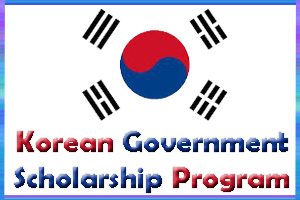Applications are invited for the Korean Government Scholarship Program from graduate students of 167 countries. Up to 700 scholarships are available for masters and PhD degree programmes.
The Korean Government Scholarship Program is designed to provide higher education in Korea for international students with the aim of promoting international exchange in education, as well as mutual friendship amongst the participating countries.
-
Award
-
Application Process
-
Clarity of Information
Summary
Wonderful offer!
User Review
( votes)GKS (Global Korea Scholarship) Program is a scholarship program that paid by the Government of the Republic of Korea for foreign nationals in the Republic of Korea and the Ministry of Education organized, responsible for the project implementation agency directly under the Ministry of Education National Institute for International Education.
Scholarship Description:
- Application Deadline: Closed
- Course Level: Scholarships are available for pursuing undergraduate program at Participating Universities in Korea.
- Study Subject: Applicants must choose their field of study from the listed programs in the university information section provided by participating universities.
- Scholarship Award: Scholarship benefits are:
- Scholarship Period: March 1, 2019 ~ February 29, 2024 (1-year Language + 4-year Degree Program)
- Number of Scholarships: 105 [from 67 countries]
- Nationality: International students
- Scholarship can be taken in Korea
Eligibility for the Scholarship:
- Eligible Countries: International students can apply for the Korean Government Scholarship Program.List of Countries: China, United States of America, Indonesia, Russia, Vietnam, Japan, India, Brazil, Myanmar, Ecuador, Bulgaria, Kyrgyzstan, Turkey, China, United States of America, Indonesia, Russia, Vietnam, Japan, India, Brazil, Myanmar, Ecuador, Bulgaria, Kyrgyzstan, Turkey, Azerbaijan, Cambodia, Colombia, Cote d’Ivoire, Egypt, Germany, Israel, Italy, Mexico, Morocco, Nigeria, Panama, Senegal, Serbia, Taiwan, The United Kingdom, Tunisia, Turkmenistan, Uganda, Afghanistan, Argentina, Armenia, Brunei, Canada, Chile, Democratic Republic of the Congo, El Salvador, Finland, France, Gabon, Georgia, Hungary, Iraq, Jordan, Nepal, Oman, Republic of South Africa, Rwanda, Singapore, Sudan, Tajikistan, Tanzania, Timor-Leste, Venezuela, Algeria, Australia, Austria, Belarus, Belgium, Bolivia, Botswana, Burundi, Canada(Quebec), Costa Rica, Croatia, Czech Republic, Denmark, Dominican Republic, Fiji, Gambia, Greece, Guatemala, Honduras, Hong Kong, Iran, Ireland, Jamaica, Kuwait, Kenya, Latvia, Lebanon, Libya, Malawi, Mozambique, Netherlands, New Zealand, Norway, Paraguay, Poland, Portugal, Romania, Saudi Arabia, Slovakia, Slovenia, Spain, Switzerland, Sweden, the Bahamas, Togo, Trinidad and Tobago, Ukraine, Uruguay, Zambia , Zimbabwe, Albania, Angola, Bahrain, Barbados, Benin, Bosnia and Herzegovina, Burkina Faso, Central African Republic, Comoros, Djibouti, Equatorial Guinea, Estonia, Guinea-Bissau, Greenland, Guyana, Haiti, Lesotho, Madagascar, Mali, Mauritania, Mauritius, Montenegro, Namibia, Nicaragua, Niger, Palestine, Papua New Guinea, Qatar, Republic of the Congo, Republic of Seychelles, Saint Kitts and Nevis, Sao Tome Principe, Somalia, Suriname, Swaziland, Syria, United Arab Emirates, The United States, France, Australia, Belgium, Canada, Denmark, Germany, Italy, Netherlands, Norway, Sweden, Switzerland, Indonesia, Vietnam, Uzbekistan, Mongolia, Thailand, Cambodia, Kazakhstan, Philippines, Ethiopia, Malaysia, Myanmar, Pakistan, Russia, Bangladesh, Brazil, Mexico, Nepal, Nigeria, Ghana, India, Kyrgyzstan, Cameroon, Rwanda, Sri Lanka, Taiwan, Tanzania, Turkey, Egypt, Poland, Romania, The United States, Uganda, Yemen, Azerbaijan, Colombia, Guinea, Hungary, Laos, Liberia, Peru, Senegal, Algeria, Chile, Costa Rica, Dominican Republic, France, Germany, Iran, Italy, Japan, Jordan, Kenya, Lithuania, Mauritania, Moldova, Morocco, Netherlands, Sierra Leone, Singapore, Spain, Tajikistan, the Democratic Republic of the Congo, the United Kingdom, Turkmenistan, Ukraine, Zambia, Argentina, Australia, Austria, Belarus, Belgium, Belize, Bolivia, Bhutan, Bulgaria, Canada, Finland, Gabon, Greece, Israel, Lebanon, Maldives, New Zealand, Paraguay, Republic of the Congo, Slovakia, Solomon Islands, Sudan and Timor-Leste.
- English Language Requirements: Applicants with certified scores on their proficiency in Korean or in English might be given preference. Some examples include the following: – Proficiency in Korean: TOPIK (Test of Proficiency in Korean) – Proficiency in English: TOEFL, TOEIC, or IELTS Academic.
Application Procedure:
Undergraduate and graduate school: Submit your application to one of the Korean diplomatic missions in Korea or one of the
Korean mathematics colleges.
- How to Apply: Applicants must apply for the Korean Government Scholarship Program via either the Embassy Track or the University Track.
- (1) Required Documents: 1 set of the original documents below, and 3 sets of the photocopies of the original
- Completed Application Form (Form 1)
- NIIED Pledge (Form 2)
- Personal Statement (Form 3)
- Study Plan (Form 4)
- Two Recommendation Letters (Form 5)
- Must be from two separate recommenders.
- The letters must be written by someone who can give an in-depth assessment of the applicant’s abilities, including a high school teacher, principal, or academic advisor.
- Completed Self Medical Assessment (Form 6)
- Graduation Certificate of High School
- Those who are expected to graduate may submit a provisional graduation certificate in high school.
- High School Grade Transcript (including a description of the school’s grading system)
- Certificates of Citizenship of the Applicant and Parents (Examples: a birth certificate, a government-issued certificate indicating the parent-child relationship, a family register, or parents’passport copies)
- Awards (Optional)
- Applicants with certified scores on their proficiency in Korean or in English may be given preference. Some examples include the following:
- Proficiency in Korea: TOPIK (Test of Proficiency in Korean)
- Proficiency in English: TOEFL, TOEIC, or IELTS Academic (TOEFL ITPs are not acceptable)
- DD214 or other relevant documents to prove the family member’s service at the Korean War


